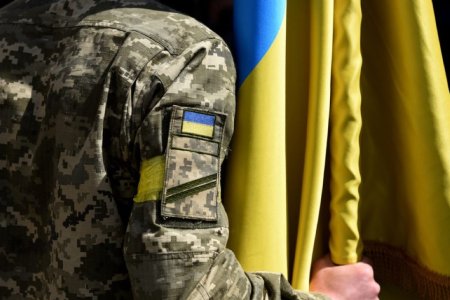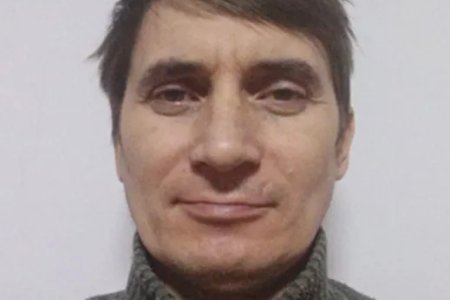
The Jehovah’s Witnesses have reported that Ukrainian believer Vitalii Kryushenko has begun serving a three-year sentence for refusing to take up arms, something his faith prevents him from doing. Ukrainian believers’ constitutional right to alternative service is not recognized during the martial law introduced because of Russia’s full-scale invasion of Ukraine, with Kryushenko not the only believer to have been denied a way of reconciling his faith with his duty as a Ukrainian citizen in wartime.
JW.org report that Kryushenko began serving the 3-year sentence on 27 January 2025 and that he is the first Jehovah’s Witness to be imprisoned for refusing to serve in Ukraine’s military. Kryushenko was called up in April 2024 and immediately applied to do alternative civilian service.
This is in full accordance with Ukraine’s Constitution, Article 35 of which states: “No one shall be relieved of his or her duties before the State or refuse to perform the laws for reasons of religious beliefs. In the event that the performance of military duty is contrary to the religious beliefs of a citizen, the performance of this duty shall be replaced by alternative (non-military) service.”
Despite this, a court in July 2024 convicted Kryushenko of evading military service and sentenced him to three years’ imprisonment. His appeal was rejected by the Sumy Court of Appeal, and the sentence came into force.
The website reports that 700 other Ukrainian Jehovah’s Witnesses are facing similar prosecution as conscientious objectors.
The case of one Jehovah’s Witness was reported here in January 2024. On 12 January 2024, the Boryspil Municipal-District Court took a different position and acquitted the believer of having deliberately sought to evade military service. In July 2023, the believer had refused to obey a military summons. He had since provided the court with a letter from the Jehovah’s Witnesses, confirming that he had been a member of their community since 1998 and asked that he be allowed to exercise his constitutional right to non-military service.
The military authority’s lawyer then argued that Ukraine’s legislation does not envisage such non-military alternative service where mobilization is concerned during martial law. She cited the Law on Military Duty and Military Service which allows for certain restrictions to the right to alternative service during martial law or states of emergency. The argument here, however, is that the presidential decree from 26 November 2018 which allowed for the suspension of certain rights and liberties enshrined in Ukraine’s Constitution did not include the right to alternative service as spelled out in Article 35.
The court in Boryspil rejected the military authority’s arguments and upheld the Jehovah’s Witness’ right to an alternative, non-military, form of service during mobilization, since he belongs to a faith which prohibits any use of weapons. The fact that the Law on Mobilization did not specify the right to alternative non-military service in the case of mobilization and during martial law did not negate the right to such alternative service, as enshrined in the Constitution.
This position had, in fact, earlier been taken by the Higher Specialized Court of Ukraine on Civil and Criminal Matters on 23 June 2015. In considering the situations arising as a result of the military conflict in Donbas, that court concluded that the lack of a mechanism for alternative non-military service during mobilization cannot constitute grounds for prosecuting a person who, for religious reasons, refuses to take up arms, while seeking an alternative form of service.
It is frustrating that two Ukrainian courts in the case of Valerii Kryushenko have taken a different position, one which must inevitably lead to Ukrainian believers being left with no choice but to accept imprisonment, rather than do something explicitly in conflict with their faith.
The right to an alternative to military service has always had its restrictions, reflected in the fact that the right is spelled out in the article of the Constitution pertaining to freedom of religion. There is no provision for alternative service in cases where people have other grounds, such as pacifist beliefs, for being a conscientious objector. The same may well, however, be true in any country at war. It is noteworthy that the Charter of Fundamental Rights of the [European] Union states in Article 11-70 part 2 that “the right to conscientious objection is recognised, in accordance with the national laws governing the exercise of this right.”
With respect to the right to alternative service based on religious faith, an appeal was recently directed to Ukraine’s Constitutional Court. As Dr Andrii Nekoliak explained in November 2024, this was lodged by Dmytro Zelinsky, a Seventh Day Adventist who was denied his right to alternative service, with the military authority in Kremenets also arguing that such alternative service is not available in wartime. Zelinsky was, instead, charged with ‘evading call-up to military service during mobilization’ (Article 336 of Ukraine’s Criminal Code). He was initially acquitted on 5 June 2023 by the Kremenets District Court, however this was overturned on 28 August 2023 by the Ternopil Court of Appeal and Zelinsky received a 3-year sentence which he has been serving since November 2023. Zelinsky’s religious beliefs were not placed in question, with he too having been a member of a Seventh Day Adventist church for two decades.
In June 2024, the appeal court’s verdict and sentence were upheld by a cassation chamber of Ukraine’s Supreme Court. The ruling, rather contentiously, stated that ““No religious beliefs can be the basis for evading military service by a citizen of Ukraine recognized as fit for military service in order to fulfil his constitutional duty to protect the territorial integrity and sovereignty of the State from military aggression by a foreign country.” It also asserted that Zelinsky could have joined the armed forces for other, non-combat duties, such as construction work supporting the frontline. It is unclear how Zelinsky or his lawyers have responded to this, and whether such an alternative was ever offered. This, in fact, seems a crucial issue which is not being adequately addressed. There are surely a huge number of jobs that believers could do instead of combat duty, both on the frontline and as rescuers, etc. in areas which Russia is subjecting to near daily bombing.
The key issue, over which Zelinsky has turned to the Constitutional Court, is the fact that Ukraine’s 1991 Alternative Service Act does not provide for non-military alternative service during wartime and that Article 1 of this Act only applies to regular conscription, not wartime service. Zelinsky has asked the Court to consider whether Article 1 is constitutional, in view of the clearly articulated right to alternative service in Article 35 of the Constitution. The latter does not distinguish between military service or duty in peacetime, via conscription, or wartime, via mobilization. Zelinsky insists that this right and the guarantee of alternative service should apply also in wartime.
As Nekoliak points out, the Constitution, in Article 64, specifies the rights and freedoms which can be derogated during martial law or a state of emergency. The list given does not include the guarantees enshrined in Article 35, including the right to alternative service.
In a judgment from July 2024 concerning the rights of people in custody, the Constitutional Court judges were “unequivocal in their support of the supremacy of the constitutional norm and did not bend to any consideration of practical convenience when protecting a person’s right to fair trial”.
While calling the Zelinsky case “paradigmatically similar to that July 2024 case”, Nekoliak notes the extreme sensitivity of this subject in the middle of Russia’s war against Ukraine. While unclear as yet how the Constitutional Court will decide, one option which Nekoliak mentions will be for the judges to essentially drag their heels as there is no deadline for a decision.
It would certainly not be the first time, but it seems a very bad option when believers are facing imprisonment despite the rights enshrined in Article 35 of Ukraine’s Constitution.


